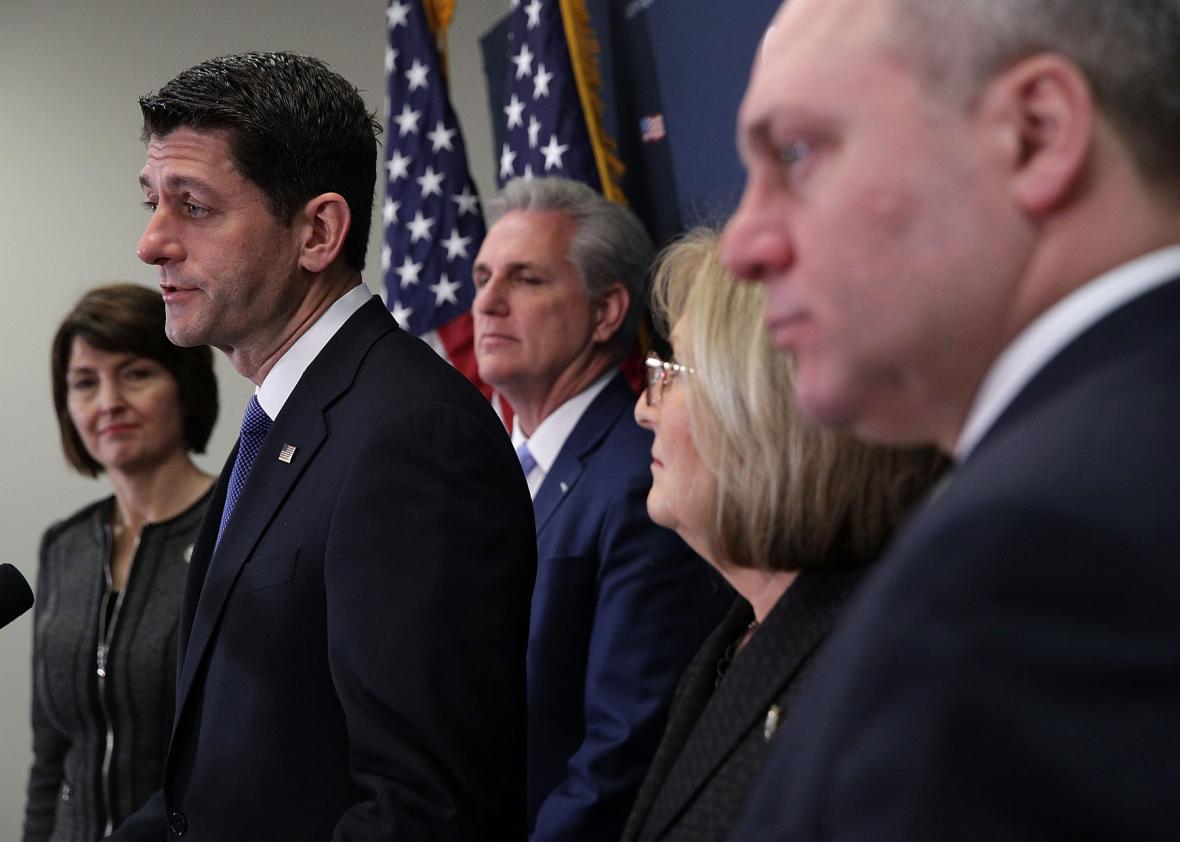The slow death of Zombie Trumpcare 2.0 continues apace, and House Republicans will soon go home to their districts for a two-week recess empty-handed.
They are not happy.
The health care negotiations of the last week, which could be viewed as members engaging in a series of blame-shifting traps laid by one culpable caucus for another, did not culminate in a deal during a critical meeting Tuesday night. The problem seemed to be that moderate and conservative members had different understandings of the compromise that the White House, brokered by Vice President Mike Pence, had been shopping. In short, moderates understood that states would be able to opt out of fewer insurance regulations under the new deal, while conservatives understood that they would be able to opt out of nearly all of them. That is a big, important discrepancy. It was apparent throughout Tuesday that not everyone was on the same page.
The failure to reach an agreement again has all sides scrambling to their bunkers. Michael Needham, CEO of the Freedom Caucus–aligned pressure group Heritage Action, held a conference call with reporters Wednesday morning attempting, in a way that’s not conducive to further cooperation, to bury the moderate Tuesday Group caucus as the source of all problems. “I think the Tuesday Group clearly wants to keep Obamacare in place,” he said, adding that “there’s not momentum at this point, and it’s because of the intransigence of the Tuesday Group.” Needham went so far as to name specific moderate members. In other words: Direct your tweets at them over the recess, Donald Trump—not at Freedom Caucus members.
A spokesman for Tuesday Group co-chairman New Jersey Rep. Tom MacArthur, in a statement provided to the Hill, said that MacArthur “simply isn’t interested in playing the D.C. blame game and will continue to focus on solutions, not lame political soundbites.” Another Tuesday Group co-chairman, Pennsylvania Rep. Charlie Dent, has essentially been frozen out of negotiations at this point.
“I think we need a cooling-off period,” North Carolina Rep. Patrick McHenry, the House leadership’s chief deputy whip, said Wednesday afternoon. “We need people to stop, take a deep breath, and think through the way to get the yes.” McHenry was dutifully trying to keep his calm but did not seem in the best mood. When one reporter asked him a question about something he’d explained earlier, he said, “Are you late to the conversation here? OK, thanks,” and moved on.
When asked whether it would be tough for members to go home for the recess without any new text to show their constituents, McHenry just said “yes.”
House Republicans are furious about the process that got them here in the first place: having to pass a bill through reconciliation, which allows them to bypass a Senate filibuster but also places restrictions on what repeal provisions they could include in the legislation. Arizona Rep. Trent Franks, a Freedom Caucus member who’s been easier to get to “yes” than some of his fellow caucus members, was running especially hot over this on Wednesday. He believed that they shouldn’t have bothered with reconciliation: They should have passed a “clean” Obamacare repeal bill through the regular process, like they’ve done dozens of times since 2010, and then applied pressure on Senate Republicans to muscle it through even if that meant changing Senate rules.
McHenry, too, said that if there is one thought binding House Republicans together, it’s that the Senate is the source of all wrong in the world.
“I will tell you that there is unanimous view of House Republicans that the Byrd Rule”—the rule governing what can be included under reconciliation—“is awful,” McHenry said. “It’s much the reason why, regardless of your partisanship in the House, you hate the Senate.”
But concerns over Senate rules aren’t the main obstacle for House Republicans now. At this late, desperate stage, saving face is a bigger priority than getting legislation to the president’s desk. House Republicans just want to be able to say that they were able to pass something, anything, and if it doesn’t conform with Senate rules, so be it—as long as it conforms to what their constituents want.
And therein lies the problem. House Republicans might be able to bond over their mutual disgust with the Senate, but they still have different backgrounds, districts, ideologies, and political pressures. The two-week “cooling off” period in their home districts won’t help members reach the consensus that has eluded them. It will entrench them in their positions.
